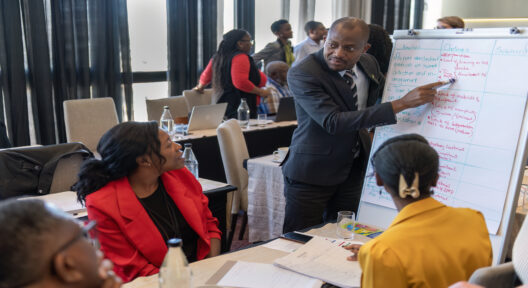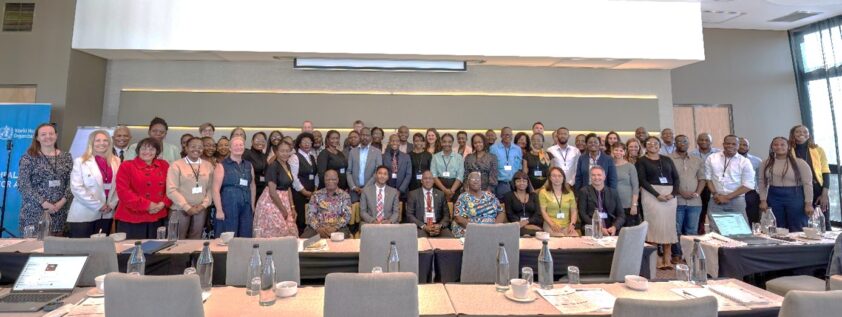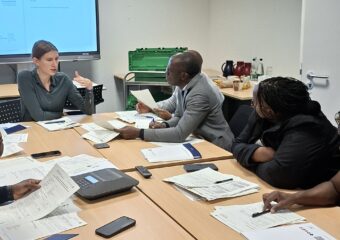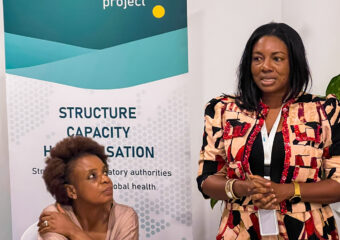Namibia’s 2024 National Stakeholder Meeting on Antimicrobial Resistance
Tackling antimicrobial resistance is a One Health priority in Namibia.
Namibia’s National stakeholder meeting on antimicrobial resistance focused on milestones in implementing its National Action Plan.

In April 2024, the third national stakeholder meeting on antimicrobial resistance (AMR) was held in Windhoek. It was organised in collaboration between the Namibian Ministry of Agriculture, Water and Land Reform (MAWLR), the Ministry of Health and Social Services (MoHSS), the Ministry of Environment, Forestry and Tourism (MEFT), and the Friedrich- Loeffler-Institut (FLI). Building on last year’s AMR stakeholder engagement, the meeting assessed the progress on implementing Namibia’s National AMR Action Plan (NAAP). It also explored and showcased national and regional AMR priorities and evaluated cross-sectoral synergies to combat AMR through a One Health approach.
Diverse Stakeholder Participation
The event provided a platform for a broad outreach to stakeholders in the field of AMR, covering the Quadripartite Alliance. Its members are the Food and Agriculture Organisation of the United Nations (FAO), the World Health Organization (WHO), the World Organisation for Animal Health (WOAH), and the United Nations Environment Programme (UNEP). Further affiliates were relevant Ministries and AMR focal points from different sectors. Participants from academia, farmers, state as well as private vets and veterinary associations were present. Additionally, private sector entities, medical doctors, international organizations working in Namibia, and the media participated.
Key Sessions and Discussions
The workshop featured a series of national and international presentations, offering insights into AMR activities at national, regional, and global levels. The topics covered included substandard and falsified veterinary products, AMR in aquaculture, national human AMR surveillance data, youth engagement, and case studies from local intensive care units.
Group and panel discussions focused on identifying challenges and potential solutions to support the implementation of the NAAP. Key challenges highlighted included the lack of AMR awareness, siloed efforts, and limited baseline data. Additional topics addressed included antimicrobial usage, surveillance, regulation of over-the-counter antibiotics, identification of falsified veterinary products, waste disposal from healthcare facilities, and aquaculture. Potential solutions for leveraging sustainable national and international funding for the NAAP were also discussed. As a recommendation for 2025, participants suggested extending the meeting to include additional stakeholders such as senior government officials, human healthcare associations, youth organisations, and communal farmers.
Highlights and Participant Feedback
Participants praised the overall atmosphere of learning and interaction. They highlighted the contributions and case reports illustrating key points about AMR. The opportunities for networking and information sharing were well-received, along with the interactive discussions with experts and the insights from various sectors. Additionally, the youth engagement and regional experiences but also the interactive polls and the general optimism about ongoing and future AMR initiatives were appreciated.
Moving forward
The 2024 National AMR Meeting marked a critical step towards addressing AMR through a One Health approach in Namibia. Proposed work plans highlighted the need for robust data collection, increased AMR funding, and widespread public awareness to effectively implement the NAAP. The collective efforts of all stakeholders are essential to mitigate the threat of AMR and protect public health.
We will continue to build on our collective knowledge of the national, regional, and international status of AMR. We will expand our current networks to gain more knowledge and skills on AMR, and we will continue to identify gaps and build capacity for data capture and analysis.
Thank you all for your collaboration, input, and hard work. We are looking forward to seeing you all again in 2025!




